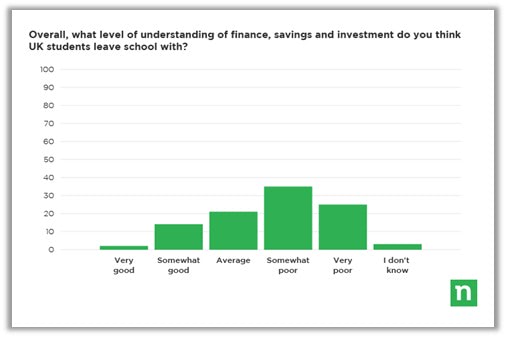Two thirds of teachers believe students leave school with a poor level of financial understanding

Two thirds (60%) of UK teachers believe students leave school with a poor level of financial understanding while 70% of students reported acquiring their financial knowledge from their parents rather than formal education, new research from Nutmeg, the UK’s largest digital wealth manager, has found.
The UK is rated below average when it comes to teaching finance in schools despite it being a mandatory part of the curriculum.
In fact, 37% of students who are in the relevant age bracket for this curriculum said they aren’t or weren’t taught finance at school.
While three-quarters (74%) of teachers felt that financial education is as important or more important than non-core subjects like history and geography, 42% of them scored their own financial knowledge at 5 out of 10 or lower.
Whether this is due to the curriculum, lack of resources or their own attitude towards finances is unclear, but teachers felt that their students were similarly struggling, with 60% believing that students leave school with a poor level of financial understanding.

Lisa Caplan, head of financial advice, Nutmeg, said:
“At a time when personal debt in the UK is at record highs, pension pots are falling behind and mortgage and rent costs are rising, we need to be doing more to ensure young people aren’t left making big financial decisions without enough financial understanding. However, our research has found that students are leaving school with little financial literacy and a poor level of financial understanding.”
Two-thirds (67%) of pre-curriculum respondents agreed that if they’d learnt more about personal finance at school, they would have more confidence with their finances as an adult. However, Nutmeg research suggests that the current solution to financial education is still not having the necessary impact, with nearly half (44%) of those exposed to financial education in schools not knowing or not feeling like they could confidently manage financial products. And a third (34%) of post-curriculum respondents said that lessons made no difference in how confident they feel in their financial decisions.
Caplan concluded: “We understand that there is a confidence crisis in the UK and financial education is important to help people make good quality, well-informed decisions that will make a difference to their future. This can be the difference between a smooth financial journey or sleepless nights, so we believe a real focus needs to be put on ensuring young people are receiving sufficient financial education.”
Research: All figures, unless otherwise stated, are from OnePoll. Research was carried out on behalf of Nutmeg. Total sample size was 1,100. Fieldwork was undertaken between 11th and 16th April 2019. The survey was carried out online. The survey targeted 500 respondents age 16-19, 500 respondents age 21+ and 100 teachers.











Responses